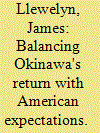| Srl | Item |
| 1 |
ID:
094992


|
|
|
|
|
| Publication |
2010.
|
| Summary/Abstract |
The Vietnam War greatly destabilized Southeast Asia and led to almost a decade of fighting by America and its Asian allies. It was fought on the principle that if communism was unchecked it would overrun the region, with the Southeast Asian countries falling under communist control like 'dominoes'. While countries such as Thailand, South Korea, and Australia provided military support to assist American strategic objectives, Japan, however, was constrained by its peace constitution and thus unable to provide direct military assistance. Nonetheless, under the leadership of the avid anti-communist conservative leadership of Prime Minister Eisaku Sato, Japan still managed to play a role in the Vietnam War. Although Japan initially entertained the notion of facilitating mediation, with Okinawa's reversion hanging in the balance after 1967, Japan's leadership took a more hawkish approach on Vietnam in order to ensure that Washington would agree to reverting Okinawa to Japanese administrative control.
|
|
|
|
|
|
|
|
|
|
|
|
|
|
|
|
| 2 |
ID:
076131


|
|
|
| 3 |
ID:
135935


|
|
|
|
|
| Summary/Abstract |
With Japan viewing Southeast Asia as its natural sphere of influence and a region of immense economic complementarities and potential, it was no surprise that Japan moved quickly in the post-war period to shore up and rebuild its influence in this strategically vital region as the European colonial powers departed from Southeast Asia. Using reparations, followed by aid and trade, Japan soon became a key economic and strategic state actor in Southeast Asia.
Providing a valid counterpoint to communism, Japan proved an attractive economic model that enabled it to grow its influence in the region substantially. Using deft and low-profile diplomacy Japan became an economic leader and driver of economic growth and prosperity in Southeast Asia, supplementing and supporting US Cold War regional objectives. During times of conflict, Japan worked to reduce tensions and restore order using its unique brand of Asian diplomacy, not losing sight of its long-term goal of integrating the region economically and fostering regional peace and stability.
|
|
|
|
|
|
|
|
|
|
|
|
|
|
|
|
| 4 |
ID:
108885


|
|
|
|
|
| Publication |
2011.
|
| Summary/Abstract |
During the Vietnam War there were high expectations from the Johnson and Nixon Administrations for Japan and Britain to provide practical and political support for American military and strategic objectives in Indochina. The leader of Japan's conservative Liberal Democratic Party, Sato Eisaku, and the British Labour Party's Harold Wilson, balanced political support for the United States with significant public pressure at home to eschew any entanglement in the highly unpopular conflict. As junior allies of the United States both Sato and Wilson did not want to see the United States fail in Vietnam or the communist sphere expand in Southeast Asia. Both leaders accrued significant foreign policy advantages as a result of politically and publicly supporting American actions in Vietnam. But to placate domestic electorates that clearly felt uncomfortable over their governments providing explicit, albeit non-military, support to the United States in Vietnam, Sato and Wilson expended substantial prime ministerial diplomacy in attempting to play a mediatory role in the conflict. Each was highly successful in balancing domestic and American demands, whilst maintaining their security partnerships with the United States.
|
|
|
|
|
|
|
|
|
|
|
|
|
|
|
|